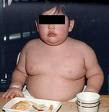I was asked to comment in a Danish newspaper on a recent BBC article last week, so I thought I’d share my thoughts with you as well!
A recent study from the UK suggests that childhood obesity is more closely linked to obesity in a same-sex parent than to obesity in a parent of the opposite sex.
Is this surprising, I was asked? Not surprising at all. Obesity is a consequence primarily of environmental and behavioral factors, in the context of an individual’s genetic tendencies. It is clear that obesity tends to run in families, partly because of genetics, but with a strong influence of learned behaviors within that family unit (poor eating habits, etc).
Enter the gender role: we all know that little girls look up to their female adult role models, and little boys to the older men in their lives, and as such, they want to emulate the behaviors of those people they look up to. If mom wears high heels, then so does the little girl want to try them out; if mom wears blue eyeshadow, then little Jane wants to as well.
This emulative behavior is no different when it comes to healthy or unhealthy lifestyles.
If mom likes to roll out and eat a batch of Pilsbury cookies after dinner, then the girl wants to take part in the baking, and surely the eating, too. If mom, however, is out for a figure skate on a winter day, or snacking on some funny looking jicama (vegetable) or edamame beans, then little Jane is more likely to adopt those healthy behaviors instead.
This same study found that 41% of eight-year-old daughters of obese mothers were obese, whereas only 4% of daughters of normal-weight mothers were obese.
Do obese children turn into obese adults?
OR
Do obese parents lead to obese children?
The important take home message here is that obesity treatment needs to be a family based approach. The focus of obesity treatment is a shift in lifestyle paradigm – it makes no sense to try to teach an obese child this new behavioral paradigm if the parents are not involved too. As an example, I am currently involved in a research study at the University of Calgary and Alberta Children’s Hospital, which is studying the effect of a child’s portion control plate to treat childhood obesity. For each child in the study who is using this ‘Magic Plate’, we are also providing the parents with the adult version of the portion control plate. The goal is to alter the lifestyle of the family as a whole, such that they can adopt a new paradigm together and become healthier as a family unit!
